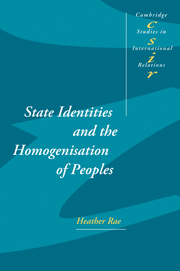Book contents
- Frontmatter
- Contents
- Preface
- Introduction
- 1 State formation and pathological homogenisation
- 2 The ‘other’ within Christian Europe: state-building in early modern Spain
- 3 State-building in early modern France: Louis XIV and the Huguenots
- 4 Pathological homogenisation and Turkish state-building: the Armenian genocide of 1915–1916
- 5 ‘Ethnic cleansing’ and the breakup of Yugoslavia
- 6 Evolving international norms
- 7 On the threshold: the Czech Republic and Macedonia
- Conclusion
- Bibliography
- Index
- CAMBRIDGE STUDIES IN INTERNATIONAL RELATIONS
6 - Evolving international norms
Published online by Cambridge University Press: 22 September 2009
- Frontmatter
- Contents
- Preface
- Introduction
- 1 State formation and pathological homogenisation
- 2 The ‘other’ within Christian Europe: state-building in early modern Spain
- 3 State-building in early modern France: Louis XIV and the Huguenots
- 4 Pathological homogenisation and Turkish state-building: the Armenian genocide of 1915–1916
- 5 ‘Ethnic cleansing’ and the breakup of Yugoslavia
- 6 Evolving international norms
- 7 On the threshold: the Czech Republic and Macedonia
- Conclusion
- Bibliography
- Index
- CAMBRIDGE STUDIES IN INTERNATIONAL RELATIONS
Summary
This study has highlighted an important, and until recently, overlooked aspect of state formation and the creation of state boundaries – the practice of ‘pathological homogenisation’ – which may take the form of forced assimilation, mass expulsion or genocide, by which elites have sought to construct corporate identities that legitimate their authority. I now want to trace how such practices have come to be regarded as pathological and the concomitant development of international norms that proscribe them.
Despite the discourse of sovereignty, and claims by state elites that they possess the right to define corporate identities, there has long been a two-way relationship between such claims and the efforts of the society of states to articulate principles of coexistence which limit the actions a sovereign can legitimately take, inside the state as well as externally. Although at one level sovereignty and the principle of non-intervention in a state's domestic affairs have long been taken as the ground of international politics, in practice recognition of the legitimacy of governments, which rests on internal as well as external factors, has also played an important role in interaction between states. International standards which define legitimate state action towards citizens have gained increasing moral force this century, particularly since the end of World War II, and then again after the end of the Cold War.
- Type
- Chapter
- Information
- State Identities and the Homogenisation of Peoples , pp. 212 - 248Publisher: Cambridge University PressPrint publication year: 2002

